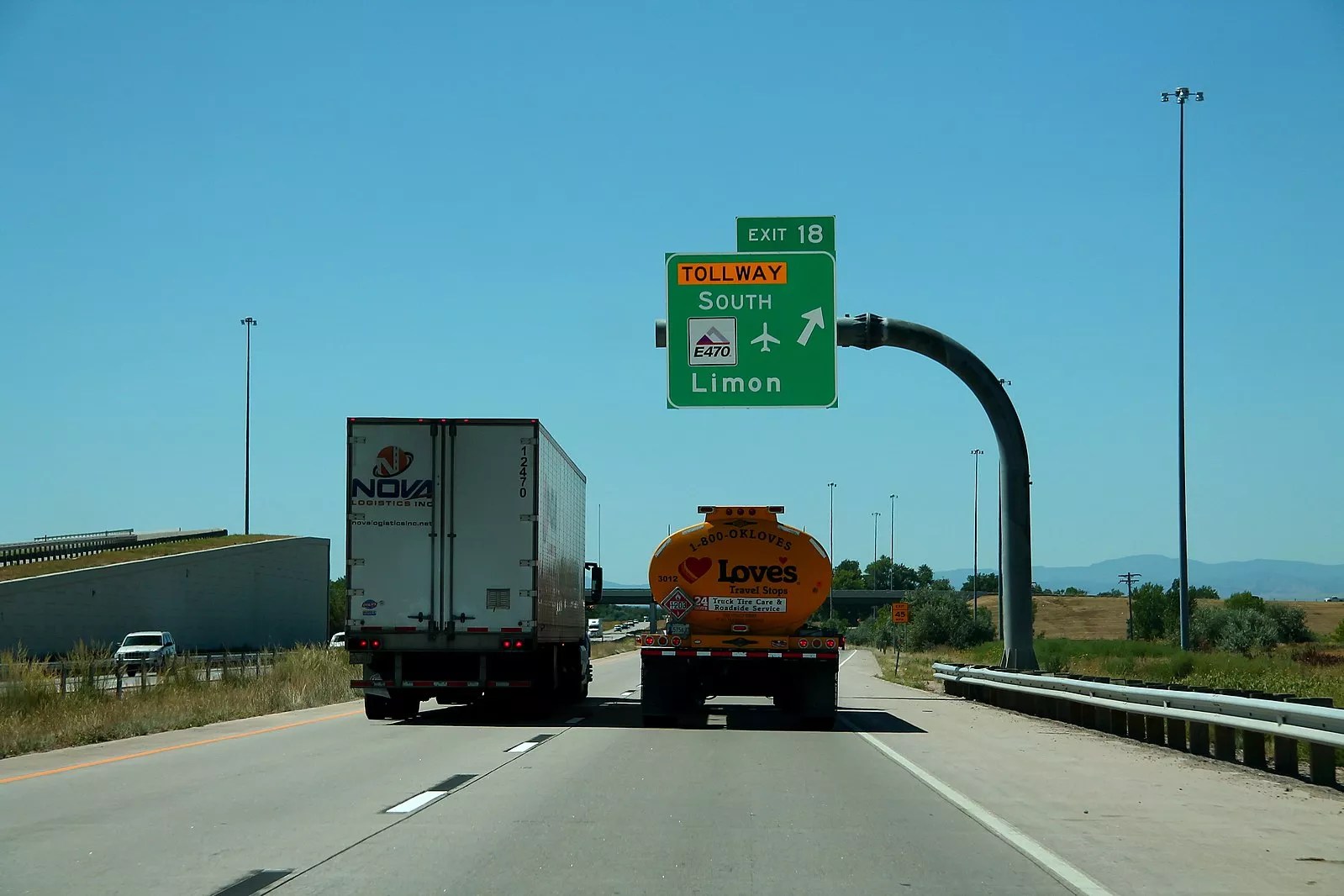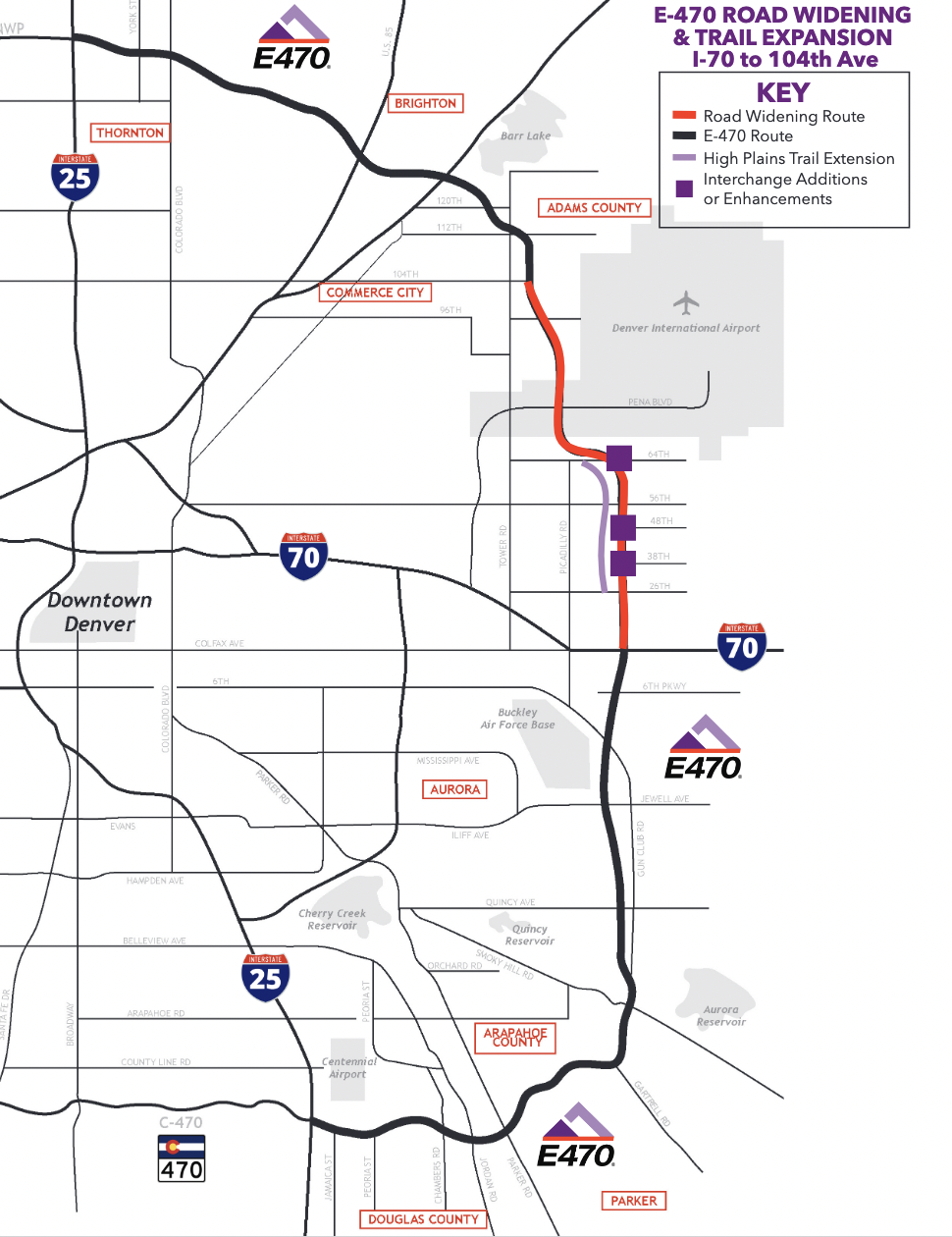
formulanone via Wikimedia Commons

Audio By Carbonatix
Adams, Arapahoe and Douglas counties formed the E-470 Authority back in 1985, with the goal of extending C-470 east and north to connect it with Interstate 70. And in 1986, the authority sold $722 million in bonds to do just that. Today, E-470 is a toll road that stretches for 47 miles in a semi-circle around the eastern edge of metro Denver; it also connects with the Northwest Parkway to the west of Interstate 25.
The E-470 Public Highway Authority, which replaced the original E-470 Authority in 1988, collects tolls to pay back the bonds and to maintain the road without using local, state or federal funding. It’s now overseen by a board of directors that includes representatives from the three counties along with Aurora, Brighton, Commerce City, Parker and Thornton
“We always fulfill our debt obligations,” says Heather Burke, public information officer and manager of communications for E-470. “We were able to lower toll rates this year while meeting our debt obligations, even despite the pandemic.”
For drivers who’ve signed up with ExpressToll, the authority collects the tolls through an electronic collection system first implemented in 2009 that is now used by the Colorado Department of Transportation for all of its express lane tolls. As of September 30, there had been over 63.5 million transactions on E-470 during the year, 1.5 percent higher than during the same time frame in 2021.
Those who register with ExpressToll prepay their accounts and receive a sticker to place on their windshields; money is automatically deducted from their accounts when their cars pass tolling points. For those without ExpressToll accounts, cameras capture images of their license plates, and invoices are mailed to the vehicle owners through the License Plate Toll bill.
According to E-470 data, those license-plate reads are over 99 percent accurate. So far in 2022, more than eight million license plate images have been processed.
Since reviewing non-ExpressToll license plates takes more time, effort and manpower, those vehicle owners pay higher tolls, says Burke.
But some drivers argue that the reviewing process can also involve mistakes that cost customers.

The plan for the E-470 widening.
E-470
Erik Vaska lived in the Baker neighborhood in 2019. He’d used E-470 to get to the airport from north of the city a couple of times and never received a bill.
“I was confused, because I expected to receive a bill in the mail,” he says. “I guess I could have gone on the website and gotten the transponder and set up an account or whatever, but it feels like the expectation is that you would receive a bill in the mail and, if you don’t, then that’s kind of the agency’s problem, not yours.”
When he moved to a duplex in Baker and set up mail forwarding, Vaska was surprised to finally receive a bill. It was for $139: $25 for his use of the road, and the rest in late fees.
He noticed that his prior address on the License Plate Bill didn’t include his apartment number; the building contained enough units that he guessed it had gotten lost. The apartment number was on his vehicle registration, though, and he was able to work with the authority to eliminate the late fees by showing that it had been trying to reach an incomplete address.
“The burden of proof was entirely on me to show that they, in fact, had the wrong address on the bill,” he remembers. “I asked them, ‘How is it not this agency’s responsibility to verify the address?'”
Vaska says that his future wife had the same problem: the License Plate Bill left the apartment number off her address, and no bills arrived before they moved in together; the couple now lives in Highlands Ranch. But according to Burke, that experience is relatively rare.
But Valerie Media, who moved to Wheat Ridge in 2020, had a similar problem – and she was registered with ExpressToll. When she moved to a new place and updated her information, she received an ExpressToll bill with over $500 in late fees for driving on the Northwest Parkway in 2011. When she called about the bill, the customer service representative for ExpressToll told her that the system might have missed the sticker on her windshield, or not connected her Northwest Parkway trips to her account.
“I got a legal notice, essentially, from the company that they use for sending out notices that, oh, this is gonna go to collections,” Media says. “It had been so long, I was surprised it hadn’t gone to collections, to be honest.”
Media was able to negotiate the charges down to $100.
Currently, tolls and the late fees charged when those tolls aren’t paid on time are being used to fund widening E-470. Construction on a project to add a third lane of traffic in both directions from I-70 to 104th Avenue began at the end of September; it’s set to be finished in 2025 and will include improvements to the High Plains Trail, which runs adjacent to the roadway and helps people on foot or bicycle access other local trails.
Burke emphasizes that E-470 is concerned with multimodal transportation and is doing more than simply expanding the highway. It’s working with Arapahoe County to build a pedestrian overpass at Parker Road and connect the High Plains Trail to the Cherry Creek Trail, for example, and is also working with the City of Aurora to connect the bike lane on Jewell Avenue to the High Plains Trail.
Some drivers, though, would like to see the authority direct a little more attention toward improving its billing systems.